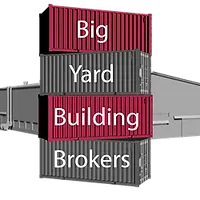https://www.freightwaves.com/news/isfs-could-be-the-next-industrial-real-estate-gold-rush
Institutional investors eyeing small outdoor properties that store transportation equipment.
There is an overlooked segment of the U.S. industrial property market potentially more lucrative and larger in aggregate square footage than the heavily publicized warehouse and distribution center asset class that has capitalized on the surge in e-commerce activity.
“Industrial service facilities” (ISFs) is the formal name for stand-alone structures used to store and maintain rigs, trailers, containers and chassis, as well as bulk materials. Fleet maintenance facilities and parking lots are also included in the ISF classification. ISFs, which have been around for years, typically are small structures that occupy between 5% and 20% of a parcel of land that the building sits on. The facilities are embedded deep in a city’s heavy industrial network, near highways and rail lines so the equipment can be utilized at a moment’s notice. Land expansion is limited because few zoning boards will approve the development of these gritty properties in residential or nonindustrial commercial neighborhoods.
Many of these buildings are controlled by high-net-worth individuals and mom-and-pop businesses. Some are as small as 100 square feet, and transaction price tags of $7 million to $10 million (if that) barely register with large-scale developers consumed by the big-box bonanza. If the big boys own any ISFs, it’s usually because they’ve come along for the ride in an acquisition involving millions of square feet of industrial space. Some developers won’t play at all because they are mandated to stick with big-box properties.
Yet from small things a big picture has begun to emerge. An article by real estate data firm CoStar that appeared earlier this month on the website of Houston-based Triten Real Estate Partners stated that there are $115 billion to $130 billion of ISF properties nationwide, according to data from CoStar and the Bureau of Economic Analysis. That compares to $45 billion to $50 billion of Class A top-tier warehouse space, according to the article. By one rough estimate, ISFs in total make up about 800 million square feet.
ISF rents are solid and rising because zoning laws put curbs on new developments. ISF tenants are stable, long-term occupants that, in turn, work with customers that have consistently recurring business. ISFs may not be sexy, but they provide must-have services for supply chains that support multiple industries. ISFs can often command higher rents per square foot of building area than warehouses and distribution centers because tenants derive additional value from the storage capabilities as well as the building itself. In addition ISFs are flexible enough to be considered candidates for conversion to other uses, though for the most part that’s not the developers’ end game.
The lure of consolidating such a fragmented but lucrative category has sparked a mini-gold rush of sorts. Triten recently secured a $150 million investment from an unidentified institutional investor to acquire about $400 million in ISF properties over the next three years, according to the article. On Monday, Atlanta-based Stonemont Financial Group, an industrial developer and real estate investor with 15 million square feet of traditional warehouse space under management, said it established a $1 billion joint venture with an affiliate of New York-based Cerberus Capital Management LP for the sole purpose of acquiring ISFs nationwide.
The venture represents Stonemont’s first foray into the ISF world. Stonemont’s core goal is to “bring this asset into the mainstream,” said Andrew T. Smith, a Stonemont portfolio manager, in a phone interview Monday.
Industrial Outdoor Ventures, a Schaumburg, Illinois-based company that has called itself the only national investor specializing in ISFs, is involved in a deal with investment firm Stockbridge Capital worth between $300 million and $400 million, according to Smith. Industrial Outdoor was unavailable to comment. The earliest deal in the cycle occurred in January 2020 when J.P. Morgan, Chase & Co. (NYSE:JPM) entered into a $300 million joint venture with Philadelphia-based Alterra Property Group LLC to buy up ISFs.
The ISF network has largely been ignored because the smallish deal sizes, on an individual basis, lack the scale that institutional investors crave. However, the promise of big-time roll-up opportunities has made institutions reexamine the sector.
“There is a whole ecosystem revolving around trucks, trailers, parking, and chassis and container yards that is under our nose in plain sight,” Scott Arnoldy, Triten’s founder, was quoted as saying in the CoStar article. “It’s just an incrementally fragmented asset class that the brokerage community is not very deep in.”







